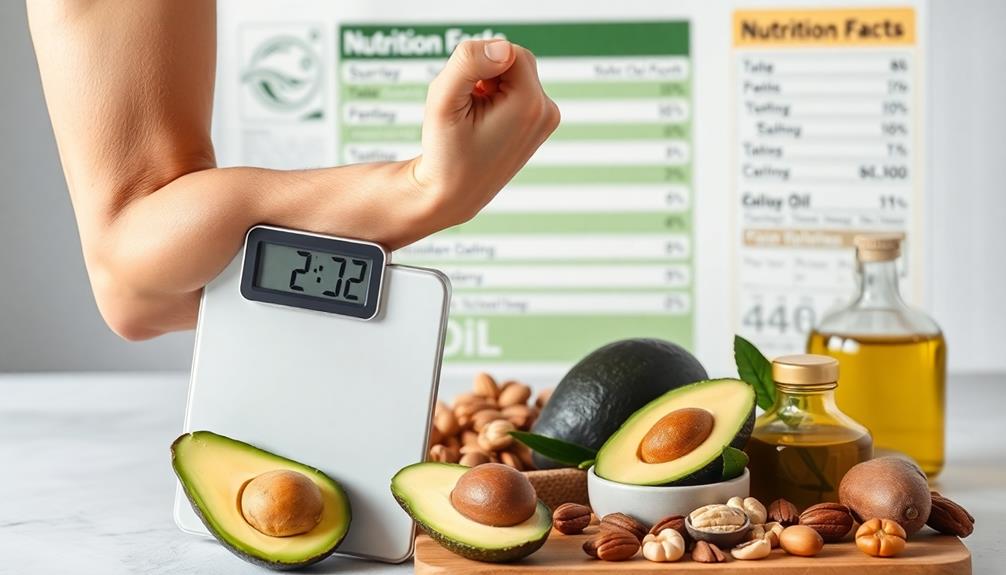To master your bulking macros in 7 steps, start by calculating your caloric needs using BMR and TDEE. Next, determine your protein requirements, aiming for 1.6-2.2g per kg of body weight. Calculate your ideal carbohydrate intake, targeting 2-3g per pound of body weight. Set your fat macros at 20-30% of daily calories. Adjust these macros based on your activity level, using an appropriate activity factor. Track your progress weekly, monitoring weight and measurements. Finally, fine-tune your macros as needed, based on your energy levels and muscle gain progress. By following these steps, you'll create a personalized nutrition plan for effective bulking.
Core Insight
- Calculate your Basal Metabolic Rate (BMR) and Total Daily Energy Expenditure (TDEE) as the foundation for your bulking macros.
- Determine your protein requirements, aiming for 1.6-2.2g per kg of body weight daily for muscle growth.
- Set your carbohydrate intake to 2-3g per pound of body weight, adjusting based on energy levels and progress.
- Allocate 20-30% of your total calories to fats, ensuring hormonal balance and nutrient absorption.
- Adjust your macros based on activity level, using an activity factor to fine-tune your calorie intake for optimal bulking results.
Understand Your Caloric Needs

To bulk up, you need to eat more calories than your body burns. First, figure out how many calories you need to maintain your current weight. This is called your maintenance calories.
Calculate your Basal Metabolic Rate (BMR), which is the energy your body uses at rest. Then, consider how active you are to find your Total Daily Energy Expenditure (TDEE). This is your maintenance calorie number.
To gain muscle, add 10-20% more calories to your TDEE. If you struggle to gain weight or have a fast metabolism, you might need to add 20-30% more calories. These are just starting points. Keep an eye on your weight and measurements each week to see if you need to adjust your calorie intake for the best muscle gain.
Don't forget about vitamin D. It's important for muscle and immune health. Get your vitamin D levels checked regularly and adjust your intake as needed to support your bulking goals.
Calculate Your Protein Requirements

When figuring out how much protein you need for bulking, it's important to understand that protein is the building block of muscle. To find your protein needs, you'll have to think about your body weight and how active you are.
A good rule of thumb is to eat 1.6 to 2.2 grams of protein per kilogram of body weight each day. For example, if you weigh 70 kg (154 lbs), you should aim for 112 to 154 grams of protein daily.
However, your specific needs may vary based on:
- How intense your training is
- Your body composition goals
- How much muscle you already have
- Your total calorie intake
To fine-tune your protein intake, start at the lower end and adjust as needed. Monitor your progress and energy levels, making small changes to get the best results.
Determine Optimal Carbohydrate Intake

Calculating your ideal carbohydrate intake is the next step after determining your protein needs for bulking. Carbs play a crucial role in providing energy for workouts and supporting muscle growth. The amount of carbs you need depends on your activity level, body composition, and total calorie goals. Using fast-acting carb powders after your workouts can help quickly replenish glycogen stores and promote optimal recovery.
Here's how to determine your ideal carb intake:
- Figure out your total daily calorie needs for bulking
- Subtract the calories from protein from your total calories
- Allocate 20-30% of the remaining calories to fats
- Assign the rest of the calories to carbohydrates
As a general guideline, aim to consume 2-3 grams of carbs per pound of body weight. However, you may need to adjust this based on your individual response and progress. Keep track of your energy levels, workout performance, and muscle gain to fine-tune your carb intake over time.
Set Your Fat Macros

Setting your fat intake is the last step in creating your bulking diet plan. After you figure out how much protein and carbs you need, the rest of your calories will come from fat. Aim to get 20-30% of your daily calories from fat. This amount helps your body make hormones and stay healthy while still leaving plenty of room for protein and carbs. When planning what to eat after your workout, think about including quick-digesting carbs to refill your energy stores and help you recover.
Here's how to calculate your fat intake:
- Multiply your total daily calories by 0.20-0.30
- Divide the result by 9 (the number of calories in a gram of fat)
For example, if you eat 3000 calories per day:
3000 x 0.25 = 750 calories from fat
750 ÷ 9 = 83g of fat
You can change this number based on what you like and how your body reacts. Just remember, fat is important for your hormones and absorbing nutrients, so make sure to include enough in your diet.
Adjust for Activity Level

Adjusting your macros based on your activity level is key to getting the best bulking results. How active you are affects how many calories you burn each day. When tweaking your macros, think about using fat burners without stimulants. These can boost your metabolism and energy without messing with your sleep.
To figure out your activity level and adjust your macros:
- Sedentary: Little to no exercise, mainly desk job
- Lightly active: Light exercise 1-3 days per week
- Moderately active: Moderate exercise 3-5 days per week
- Very active: Hard exercise 6-7 days per week
After finding your activity level, multiply your Total Daily Energy Expenditure (TDEE) by the matching activity factor. Use 1.2 for sedentary, 1.375 for lightly active, 1.55 for moderately active, and 1.725 for very active. This makes sure you're eating enough calories to fuel your activity and muscle growth goals.
Track Your Progress

Track your progress consistently when bulking. Each week, weigh yourself in the morning after using the bathroom. Every 2-4 weeks, measure your chest, waist, and arms. Log your workouts to record strength gains. Drink a post-workout recovery shake to help your muscles grow and restore nutrients.
Don't just rely on your weight, as muscle gains can hide fat loss. Take photos to visually track changes in your body. If you're not getting the results you want, change your macros. Eat more if you're not gaining weight, or eat less if you're gaining too fast. A good bulk usually means gaining 0.25-0.5% of your body weight each week. Be patient and consistent, as real changes take time.
Fine-tune Your Macros

As you make progress in your bulking journey, you'll need to adjust your macronutrients to keep seeing gains. This means looking at your results and making small changes to your diet. Muscle recovery supplements can also help you make the most of your progress and support your body during intense bulking.
To fine-tune your macros:
- Check your weight gain rate: Aim for 0.25-0.5% of body weight per week
- Look at your strength progress: If it's slowing down, try eating more carbs
- Keep an eye on your body fat: Adjust fat intake if you're gaining too much
- Pay attention to your energy levels: Increase overall calories if you're feeling tired
Frequently Asked Questions
How Long Should a Bulking Phase Last?
You'll typically want to bulk for 3-6 months. It depends on your starting point and goals. Keep track of your progress and adjust as needed. Don't let your bulk last too long to avoid excessive fat gain.
Can I Build Muscle While Maintaining a Low Body Fat Percentage?
Yes, you can build muscle while maintaining low body fat, but it's challenging. You'll need to focus on a lean bulk approach, consuming a slight calorie surplus, prioritizing protein intake, and following a rigorous strength training program.
Should I Take Supplements During My Bulking Phase?
You should consider supplements during your bulking phase. They can help you meet nutrient needs and support muscle growth. Focus on protein powder, creatine, and multivitamins. However, don't rely solely on supplements; prioritize a balanced diet.
How Do I Minimize Fat Gain While Bulking?
To minimize fat gain while bulking, you'll want to focus on a moderate calorie surplus, prioritize lean protein, choose complex carbs, and incorporate regular strength training. Don't forget to track your progress and adjust as needed.
Is It Necessary to Eat Every 2-3 Hours When Bulking?
No, it's not necessary to eat every 2-3 hours when bulking. You can focus on your total daily calorie intake instead. Eating more frequently doesn't boost metabolism or muscle growth. Choose a meal schedule that works for you.

